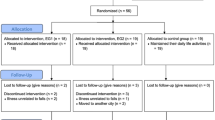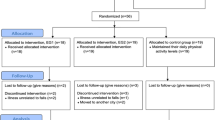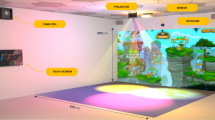Abstract
Background
Nursing home institutionalization tends to exacerbate loss of functioning.
Aims
Examine the feasibility and the effect of a psychomotor intervention—a multimodal exercise program promoting simultaneous cognitive and motor stimulation—on the executive (planning ability and selective attention) and physical function of nursing home residents.
Methods
Seventeen participants engaged in a 10-week multimodal exercise program and 17 maintained usual activities.
Results
Exercise group improved planning ability (25–32%), selective attention (19–67%), and physical function [aerobic endurance, lower body strength, agility, balance, gait, and mobility (19–41%)], corresponding to an effect size ranging from 0.29 (small) to 1.11 (high), p < 0.05.
Discussion
The multimodal exercise program was feasible and well tolerated. The program improved executive and physical functions of the nursing home residents, reverting the usual loss of both cognitive and motor functioning in older adult institutionalized.
Conclusions
Multimodal exercise programs may help to maintain or improve nursing home residents’ functioning.


Similar content being viewed by others
References
WHO (ed) (2015) World report on ageing and health. World Health Organization, Geneva
Eurostat (2015) Sustainable development in the European Union. Publications Office of the European Union. doi:10.2785/999711
Luppa M, Luck T, Matschinger H et al (2010) Predictors of nursing home admission of individuals without a dementia diagnosis before admission—results from the Leipzig Longitudinal Study of the Aged (LEILA 75+). BMC Health Serv Res 10:186. doi:10.1186/1472-6963-10-186
Rikli R, Jones C (2013) Development and validation of criterion-referenced clinically relevant fitness standards for maintaining physical independence in later years. Gerontologist 53:255–267. doi:10.1093/geront/gns071
Frandin K, Gronstedt H, Helbostad JL et al (2016) Long-term effects of individually tailored physical training and activity on physical function, well-being and cognition in Scandinavian nursing home residents: a randomized controlled trial. Gerontology 62:571–580. doi:10.1159/000443611
Volkers KM, Scherder EJ (2011) Impoverished environment, cognition, aging and dementia. Rev Neurosci 22:259–266. doi:10.1515/RNS.2011.026
Fu AS, Gao KL, Tung AK et al (2015) Effectiveness of exergaming training in reducing risk and incidence of falls in frail older adults with a history of falls. Arch Phys Med Rehabil 96:2096–2102. doi:10.1016/j.apmr.2015.08.427
Pereira C, Baptista F, Cruz-Ferreira A (2016) Role of physical activity, physical fitness, and chronic health conditions on the physical independence of community-dwelling, older adults over a 5-year period. Arch Gerontol Geriatr 65:45–53. doi:10.1016/j.archger.2016.02.004
Baernholdt M, Hinton I, Yan G et al (2012) Factors associated with quality of life in older adults in the United States. Qual Life Res 21:527–534. doi:10.1007/s11136-011-9954-z
Ferrante LE, Pisani MA, Murphy TE et al (2016) Factors associated with functional recovery among older ICU survivors. Am J Respir Crit Care Med 194:299–307. doi:10.1164/rccm.201506-1256OC
Han L, Gill TM, Jones BL et al (2015) Cognitive aging trajectories and burdens of disability, hospitalization and nursing home admission among community-living older persons. J Gerontol A Biol Sci Med Sci 71:766–771. doi:10.1093/gerona/glv159
Burton E, Lewin G, Boldy D (2015) Physical activity preferences of older home care clients. Int J Older People Nurs 10:170–178. doi:10.1111/opn.12065
Chodzko-Zajko W, Proctor D, Fiatarone Singh M et al (2009) American College of Sports Medicine position stand. Exercise and physical activity for older adults. Med Sci Sports Exerc 41:1510–1530. doi:10.1249/MSS.0b013e3181a0c95c
Karatay G, Akkus Y (2011) The effectiveness of a stimulation program on cognitive capacity among individuals older than 60. West J Nurs Res 33:26–44. doi:10.1177/0193945910371628
McDougall GJ (2001) Rehabilitation of memory and memory self-efficacy in cognitively impaired nursing home residents. Clin Gerontol 23:127–139. doi:10.1300/J018v23n03_11
Law LL, Barnett F, Yau MK et al (2014) Effects of combined cognitive and exercise interventions on cognition in older adults with and without cognitive impairment: a systematic review. Ageing Res Rev 15:61–75. doi:10.1016/j.arr.2014.02.008
Bherer L (2015) Cognitive plasticity in older adults: effects of cognitive training and physical exercise. Ann N Y Acad Sci 1337:1–6. doi:10.1111/nyas.12682
Huang TT, Chung ML, Chen FR et al (2016) Evaluation of a combined cognitive-behavioural and exercise intervention to manage fear of falling among elderly residents in nursing homes. Aging Ment Health 20(1):2–12. doi:10.1080/13607863.2015.1020411
Garber CE, Blissmer B, Deschenes MR et al (2011) American College of Sports Medicine position stand. Quantity and quality of exercise for developing and maintaining cardiorespiratory, musculoskeletal, and neuromotor fitness in apparently healthy adults: guidance for prescribing exercise. Med Sci Sports Exerc 43:1334–1359. doi:10.1249/MSS.0b013e318213fefb
Kraft E (2012) Cognitive function, physical activity, and aging: possible biological links and implications for multimodal interventions. Neuropsychol Dev Cogn B Aging Neuropsychol Cogn 19:248–263. doi:10.1080/13825585.2011.645010
Folstein MF, Folstein SE, McHugh PR (1975) “Mini-mental state”. A practical method for grading the cognitive state of patients for the clinician. J Psychiatr Res 12:189–198. doi:10.1016/0022-3956(75)90026-6
Krikorian R, Bartok J, Gay N (1994) Tower of London procedure: a standard method and developmental data. J Clin Exp Neuropsychol 16:840–850. doi:10.1080/01688639408402697
Brickenkamp R (2007) d2 Test of attention. CEGOC-TEA, Lisboa
Tinetti ME (1986) Performance-oriented assessment of mobility problems in elderly patients. J Am Geriatr Soc 34:119–126
Hair J, Black W, Babin B et al (2010) Multivariate data analysis: a global perspective. 7 edn. Pearson, New Jersey
Cohen J (1998) Statistical power analysis for the behavioral sciences. L. Erlbaum Associates, Denmark
Nishiguchi S, Yamada M, Tanigawa T et al (2015) A 12-week physical and cognitive exercise program can improve cognitive function and neural efficiency in community-dwelling older adults: a randomized controlled trial. J Am Geriatr Soc 63:1355–1363. doi:10.1111/jgs.13481
Ball K, Berch DB, Helmers KF et al (2002) Effects of cognitive training interventions with older adults: a randomized controlled trial. JAMA 288:2271–2281
Li R, Zhu X, Yin S et al (2014) Multimodal intervention in older adults improves resting-state functional connectivity between the medial prefrontal cortex and medial temporal lobe. Front Aging Neurosci 6:39. doi:10.3389/fnagi.2014.00039
Maffei L, Picano E, Andreassi MG et al (2017) Randomized trial on the effects of a combined physical/cognitive training in aged MCI subjects: the train the brain study. Sci Rep 7:39471. doi:10.1038/srep39471
Linde K, Alfermann D (2014) Single versus combined cognitive and physical activity effects on fluid cognitive abilities of healthy older adults: a 4-month randomized controlled trial with follow-up. J Aging Phys Act 22:302–313. doi:10.1123/japa.2012-0149
Bossers WJ, van der Woude LH, Boersma F et al (2015) A 9-week aerobic and strength training program Improves cognitive and motor function in patients with dementia: a randomized, controlled trial. Am J Geriatr Psychiatry 23:1106–1116. doi:10.1016/j.jagp.2014.12.191
Mulasso A, Roppolo M, Liubicich ME et al (2015) A multicomponent exercise program for older adults living in residential care facilities: direct and indirect effects on physical functioning. J Aging Phys Act 23:409–416. doi:10.1123/japa.2013-0061
McDougall G, Vance D, Wayde E et al (2015) Memory training plus yoga for older adults. J Neurosci Nurs 47:178–188. doi:10.1097/JNN.0000000000000133
Acknowledgements
Funding was provided by Fundação para a Ciência e a Tecnologia (PT) (Grant no. UID/DTP/04045/2013) and Horizon 2020—Portugal 2020—Programa Operacional Regional do Alentejo (Grant no. ALT20-03-0145-FEDER-000007).
Author information
Authors and Affiliations
Corresponding author
Ethics declarations
Conflict of interest
Authors declare no conflict of interest.
Ethical approval
Committee on Biomedical Ethics (Universidade de Évora, Portugal) approved this study. All procedures performed in the study involving human participants were in accordance with the ethical standards of the institutional and/or national research committee and with the 1964 Helsinki declaration and its later amendments or comparable ethical standards.
Informed consent
All participants gave their informed consent.
Rights and permissions
About this article
Cite this article
Pereira, C., Rosado, H., Cruz-Ferreira, A. et al. Effects of a 10-week multimodal exercise program on physical and cognitive function of nursing home residents: a psychomotor intervention pilot study. Aging Clin Exp Res 30, 471–479 (2018). https://doi.org/10.1007/s40520-017-0803-y
Received:
Accepted:
Published:
Issue Date:
DOI: https://doi.org/10.1007/s40520-017-0803-y




